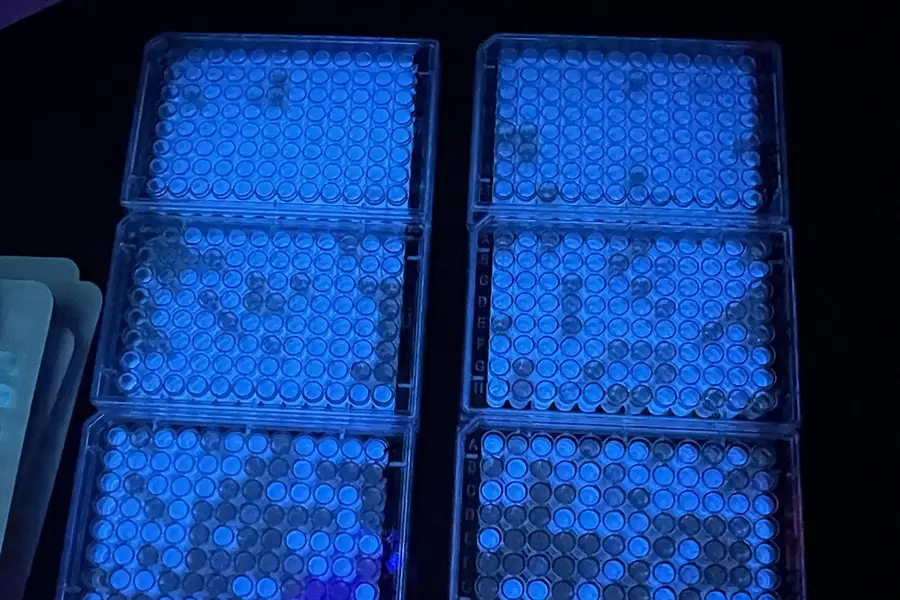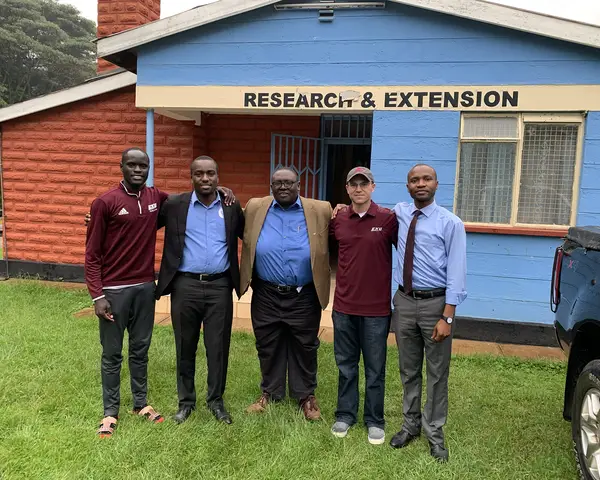
Coliglow® Kit, a kit for testing E. coli in water.
As innovation hubs grow in regions across the US, RTI’s Center for Applied Economics and Strategy has identified emerging efforts to unlock the potential of research intuitions through unified statewide alliances. We are working with organizations that are dedicated to supporting tech-based startups like Kentucky Commercialization Ventures and Launch Tennessee (LaunchTN) to identify untold stories of tech innovation and trends for growing economic opportunity in communities with underappreciated potential.
Tech Innovation in Kentucky
From the hills of eastern Kentucky to Kenya’s Rift Valley, Dr. Jason Marion saw a need. He had an idea that could potentially help millions of people but needed help to get it off the ground. With support from Kentucky Commercialization Ventures (a partner of LaunchTN), Dr. Marion’s idea is part of a growing trend of states betting on the potential of innovators at regional universities far from the traditional hotspots of the tech economy.
Catching a Lurking Threat: Advancing U.S. Tech Innovation for Clean Water Solutions
Water is life, as the saying goes, and resource-limited communities need an affordable way to find out if their water sources are contaminated. Sometimes dangerous in its own right, E. coli often signals the presence of animal and human fecal contamination—and, thus, the potential for waste-borne diseases—in drinking and irrigation water. Over 7 million people get sick each year in the United States from drinking water contaminated with waste-borne pathogens, and over 6,500 die. Lack of access to clean drinking water and sanitation kills 1.4 million people each year globally, making it one of the leading causes of death in the world, particularly among children and elderly people. One major problem is that reliable E. coli tests can be too expensive for many of the communities that need them the most.

After traveling in 2012 and 2016 with several of his Kenyan students to their home villages, where contaminated water is a persistent threat, experiencing the challenges in measuring E. coli using existing approaches, and being encouraged by local leaders in Kenya, Dr. Marion set out to create a testing kit that would be economically accessible to resource-limited communities. Developed in his university lab and tested in the streams of eastern Kentucky and then Uasin Gishu County in Kenya, the result was ColiGlow®.
But there were still big gaps between having a tool and putting it in the hands of people who need it. Dr. Marion had not been through the process of starting a company, patenting his invention, or licensing a technology, and Eastern Kentucky University did not have the dedicated resources to support him in transferring ColiGlow from the lab to the market.
Supporting Tech Innovators through Kentucky Commercialization Ventures
That is where Kentucky Commercialization Ventures (KCV) came in. An effort initially funded by the Kentucky Cabinet of Economic Development and developed by the Kentucky Science and Technology Corporation, KCV empowers ideas with transformative and market potential. Most of the universities in Kentucky do not have the institutional capacity to provide much support for researchers seeking funding or an office dedicated to commercializing new technologies. The result is that ideas stay inside university labs and struggling parts of the state miss out on economic opportunities. KCV has spent the last several years cultivating relationships with administrators and building a network to connect researchers with the resources they need to develop their ideas, found companies, and make the leap from lab to market.
Through this work, KCV found Dr. Tom Martin, then Associate Vice Provost for Research, who identified the E. Coli test kit as a promising technology. KCV helped Dr. Marion and Eastern Kentucky University to submit the patent application for ColiGlow and provided a bootcamp program to prepare to launch a new company. Dr. Marion founded Eastern Scientific LLC and licensed ColiGlow to the company. After taking home the top prize at the Global Health and Innovation Conference organized by Unite for Sight, Dr. Marion used the proceeds to manufacture and distribute kits to colleagues at Kisii University in Kenya. Since then, ColiGlow has been used by watershed organizations and also to conduct water quality research in Ecuador.
Eastern Scientific recently received a Small Business Innovation Research (SBIR) award from the U.S. Department of Agriculture to optimize ColiGlow for agricultural customers. Current development is focused on making ColiGlow applicable for users concerned about agricultural runoff from manure and for testing irrigation waters to comply with the Food Safety Modernization Act. Release of a testing kit at a price point below $10 for use by the general public is also planned within the next six months.
KCV mentorship helped facilitate my participation in the Launch Blue Accelerator program and learn the lingo and necessary steps for starting a business. As a traditionally trained academic scientist with a background in the public sector, I was unaware of the steps I needed to take to be successful in launching a business and submitting a successful SBIR application. Having KCV support was essential for obtaining SBIR support and for enabling us to establish a laboratory in the community, separate from the university. Knowing KCV is there to support us is not only reassuring for Eastern Scientific and our new employees but is also important for our government partners who want to see ColiGlow and our related technologies be further commercialized for reaching the broader market. – Dr. Jason Marion
Emerging U.S. Tech Innovation Hubs Outside Traditional Epicenters
Through RTI’s work with state and local initiatives across the U.S. to cultivate emerging technology sectors and to support the commercialization of new technologies, it's clear the ColiGlow story is part of a broader trend. States have been investing in supporting tech-based companies for decades, but there have been some big bets recently aimed at extending support for innovators outside of the traditional epicenters of the tech economy.
How Texas and North Carolina Are Expanding Tech Innovation
Texas voters overwhelmingly approved a ballot initiative late last year that created a nearly $4 billion endowment to enhance research capacity at state universities other than the state’s flagship institutions of the University of Texas and Texas A&M. The state legislature gave voters the option to use $3 billion of the state’s budget surplus and another $900 million in other funds to create the endowment. Funding will initially flow to four universities, Texas Tech University, Texas State University, University of Houston, and University of North Texas. While each institution has significant latitude on how to allocate the funding, possible uses include funding research programs, recruiting and retaining world-class researchers, financial assistance for graduate students, and creating new graduate programs.
In North Carolina, the state legislature appropriated $250 million to endow a fund that will offer competitive grants to support research and commercialization across the University of North Carolina system. While North Carolina has a long history of supporting sectors like biotechnology and the Research Triangle Park is one of the most successful tech-based developments in the world, the new fund was explicitly focused on supporting university researchers outside of the Research Triangle. In the first round of eight proof-of-concept grants announced this year, all of the initial grants went to researchers at institutions outside of North Carolina’s Research Triangle region.
This broader trend is part of what makes the ColiGlow story worth paying attention to. As states and regions increase their support for innovators outside of the traditional tech hotspots, we could see more good ideas turn into lifesaving products, more research translating into economic opportunity, and more communities benefiting from emerging tech markets.
